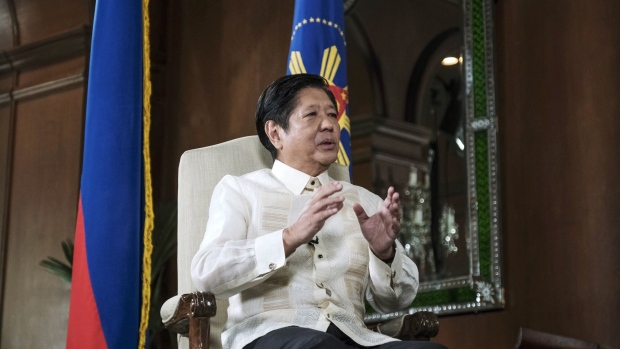Mar 19, 2024
Marcos Says Too Early for Philippine Rate Cut, Eyes 8% Growth
, Bloomberg News

(Bloomberg) -- President Ferdinand Marcos Jr. said the Philippines hasn’t reached the point where it should start cutting interest rates, citing inflation as the main worry for an economy expanding at the fastest clip in Southeast Asia.
“Inflation is still our biggest problem,” Marcos said Tuesday in his interview with Bloomberg Television’s Haslinda Amin at the presidential palace in Manila. “We’re not yet there,” he said when asked whether he sees room to cut borrowing costs that are the highest since May 2007.
Consumer price gains in the Philippines have hovered above the central bank’s 2%-4% goal for seven straight quarters, and are poised to return to target only this quarter — not enough yet for Bangko Sentral ng Pilipinas to declare victory over inflation. Even with the policy rate at a 17-year high, the economy pulled off the region’s quickest expansion of 5.6% in 2023, giving Marcos the confidence that it is capable of an even better showing in 2024.
Gross domestic product growth will probably meet the government target of as much as 7.5% this year — the region’s fastest — and even hit the 8% goal at the latter half of his six-year term ending in 2028, Marcos said. The nation last posted an expansion at the 8% level in 1976 under the late dictator Ferdinand Marcos, the president’s father.
The peso touching a three-month high this month partly reflects the economy’s strength, Marcos Jr said, welcoming any further appreciation in the currency.
Since taking office almost two years ago, the 66-year-old leader has embarked on about two dozen overseas trips, bolstering the nation’s defense ties with the US and its allies and seeking investment and trade deals along the way. An American delegation arranged by President Joe Biden this month yielded more than $1 billion in investment pledges, especially in the areas of tech and supply chains.
The president said he also wants to strengthen physical and digital connections with Asian neighbors. Even the European Union has increased its engagement with the Philippines and the region, he said.
While interest on the Philippines has improved, Marcos said much still has to be done to boost foreign investment as well as shielding the economy from further shocks and sustaining post-pandemic recovery.
In recent months, his push to loosen economic restrictions in the Constitution has faced criticisms including from his predecessor who warned that such actions may be an attempt to extend power beyond legal limits — just like his father. Marcos dismissed the rebuke and said there’s no proposal to change the country’s political structure.
By the end of his term, Marcos said he aspires to end hunger and further lower unemployment.
“It is only growth that will pull us out of the morass that was left after the pandemic,” Marcos said. “Even in terms of debt ratios, even in terms of unemployment, even in terms of inflation, it really is growth that seems to be the key,” he said.
--With assistance from Clarissa Batino, Alex Chandler, Manolo Serapio Jr. and Andreo Calonzo.
©2024 Bloomberg L.P.





